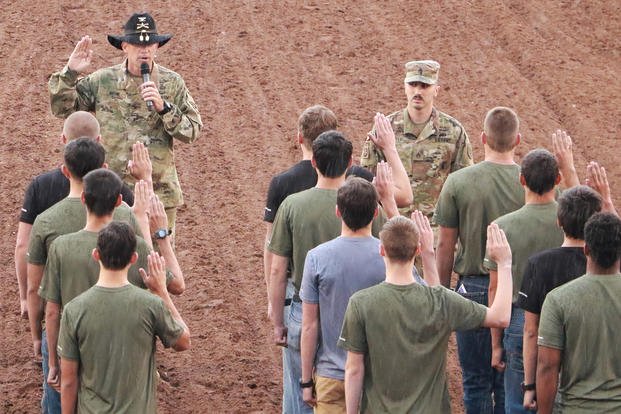After only a week, the Army has swiftly reversed a new policy that would have allowed potential recruits to enlist into the force without a high school diploma or GED, according to an internal memo reviewed by Military.com and confirmed by a spokesperson.
The Army, along with the other services, faces an ongoing crisis to fill in the ranks amid a convergence of issues, including an increasingly competitive civilian job market and the military losing some public awareness in the absence of a major conflict. So far, the Army has only hit about 40% of its recruiting goals this year.
On June 23, the service said that it would drop the requirement for completing high school under the condition that enlistees quickly ship out to boot camp, setting a deadline of Oct. 1 to begin training.
Read Next: How Do You Create a Guardian? A Look Inside Space Force's First Specialized Basic Training
However, the move was met with some mockery online and accusations of it being a desperate measure, lowering standards to fill in the ranks wherever the Army could.
"Some people have frankly become very self-conscious of the news coverage," an Army official with direct knowledge of the policy change told Military.com.
The service has relatively few options for changes it can implement quickly, so officials have chipped away at the margins where they can.
The potential recruits who would have been exempted from the high school requirement had to be 18 and score at least a 50 on the Armed Services Vocational Aptitude Battery, or ASVAB, an SAT-style quiz to measure a potential recruit's academic ability. That was a higher threshold than normal, with a 31 being the minimum score for anyone else. Scoring at least a 50 would likely qualify an individual for a healthy roster of the Army's jobs.
A lack of education plays a relatively small role in disqualifying potential recruits, with most issues related to minor criminal infractions and intense scrutiny on past minor medical and mental health issues. Only about one-fourth of young Americans are even eligible to serve, with the top problem being obesity.
Multiple sources with direct knowledge on lifting the requirement for a high school diploma or GED said that policy makers were concerned about legitimate reasons a candidate might have not finished their schooling, and raising the bar on the entrance exam was a good control factor to not lower education standards. One Army official told Military.com the lift on requiring diplomas could return.
"A score in the 50th percentile on the ASVAB is a good score," the Army official, who spoke to Military.com on the condition of anonymity because they were not authorized to talk to the press on the subject, said. "So, if someone doesn't have a GED or high school diploma, but they score well on the ASVAB, meet all other requirements, then military service could potentially be a great option for their future."
Army officials have made a number of small adjustments to make recruiting easier where they can without having negative impacts on the quality of soldiers enlisting. In a sign of the need for capable recruits, the service is offering up to $50,000 enlistment bonuses, its highest ever, and allowing recruits to pick their first duty station with some limitations.
This was on top of existing benefits that have been key for recruitment for decades, including the GI Bill, relatively cheap and easy access to health care and VA home loans -- all of which are still generally more generous than most entry level jobs for people without college degrees.
The Army has also picked low-hanging fruit such as relaxing its tattoo policies, which is expected to impact only a few hundred recruits per year. In an interview with Task & Purpose, Army Secretary Christine Wormuth has also expressed concerns that negative media attention on scandals and issues in the force, including sexual assault and harassment, suicide and other quality-of-life problems faced by the rank and file, may be impacting recruiting.
-- Steve Beynon can be reached at Steve.Beynon@military.com. Follow him on Twitter @StevenBeynon.
Related: Military Throwing Cash at Recruiting Crisis as Troops Head for the Exits












